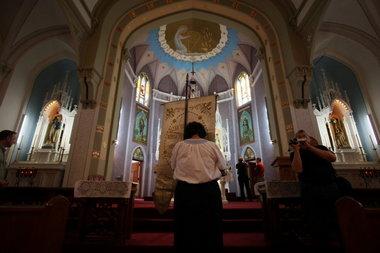By Michael O'Malley
Plain Dealer
October 8, 2010
http://blog.cleveland.com/metro/2010/10/displaced_st_emeric_parishione.html
 |
| A parishioner prays after the last service at St. Emeric, a Hungarian church on Cleveland's West Side that was closed on June 30 as part of the Cleveland Catholic Diocese's downsizing. |
CLEVELAND, Ohio -- When the Cleveland Catholic Diocese closed St. Emeric, a Hungarian church near the West Side Market, diocese officials suggested the congregation move to St. Elizabeth, another Hungarian church in a depressed area on the city's East Side.
But since St. Emeric's closing June 30, much of the 500-member congregation has scattered. Some are going to Catholic churches near where they live. Some are going to Protestant Hungarian churches where they can worship in their mother tongue as they did at St. Emeric.
Some are not going to church at all.
"It's hard to understand why they won't go to St. Elizabeth's," said diocese spokesman Robert Tayek. "They have never given us a straight answer as to why they won't go there."
Miklos Peller, the organist at St. Emeric for 30 years, responded: "We have our reasons and the diocese should not be telling us where we should be going to church."
Peller, of Westlake, and longtime parishioner Eva Szabo, of South Euclid, said St. Elizabeth on Buckeye Road is difficult to get to because there is no nearby freeway access and the neighborhood, they believe, is dangerous.
"You have to go through some really tough territory," said Szabo. "That's a risk for our elderly."
Szabo has organized a monthly Mass in Hungarian at St. Colman Catholic Church on West 65th Street. Colman's pastor, the Rev. Bob Begin, who has publicly criticized Bishop Richard Lennon over the sweeping closings of inner-city churches, has begun learning Hungarian.
"I'll learn to speak Hungarian enough to do the prayers," said Begin, who speaks Spanish and is also studying Arabic.
The Masses are held on the first Sunday of the month. About 150 people attended the latest one last Sunday and the group is discussing expanding to two Masses a month.
When St. Emeric closed, the diocese told its Hungarian-speaking pastor, the Rev. Sandor Siklodi, that he no longer had an assignment in the Cleveland diocese.
Siklodi, 63, a native of Transylvania who was at St. Emeric for 25 years, was hired Monday by the Chicago archdiocese to serve at St. Stephen of Hungary in Chicago.
In a telephone interview Wednesday, Siklodi, who also speaks English, said he did not understand why he was ousted from Cleveland, especially since Lennon cited a shortage of priests as one of his reasons for closing 50 churches.
"I feel bad," said Siklodi. "I think he believes that he has the power over life and death."
Tayek, noting that Hungarian Masses are no longer in big demand, previously had said there was no need for another Hungarian-language priest here.
Still, Szabo, Peller and other active members of the mothballed St. Emeric have set up a non-profit group to raise money to preserve their Hungarian Catholic heritage and to hold on to their 106-year-old parish.
St. Emeric is one of 13 Cleveland diocese parishes that have appeals of Lennon's closings pending in Rome. While those appeals are pending, the diocese cannot sell the church properties or their sacred artifacts.
"We still have our parish," said Peller who is now playing Hungarian hymns on Colman's organ.
Meanwhile, the St. Emeric group is putting out a call to Hungarians to fill the pews in St. Colman's, founded 130 years ago by Irish, but today heavily attended by Latinos.
"When we came to St. Colman's we were told, 'We know you're hurting and we want to take that hurt away,'" said Szabo.
To reach this Plain Dealer reporter: momalley@plaind.com, 216-999-4893
Any original material on these pages is copyright © BishopAccountability.org 2004. Reproduce freely with attribution.